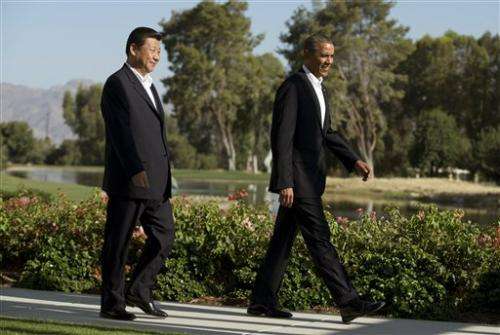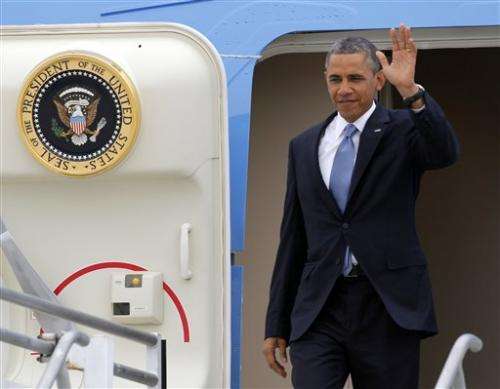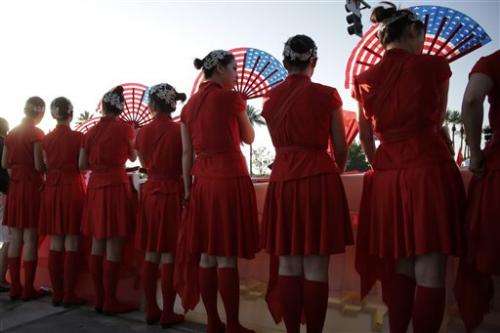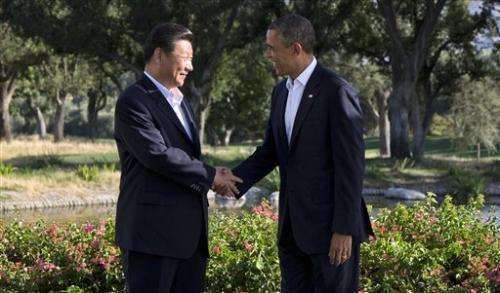Obama says US, China must develop cyber rules

President Barack Obama and Chinese President Xi Jinping, treading carefully, avoided a direct public confrontation on cybersecurity as they opened a two-day summit aimed at forging closer personal ties between the leaders of the world's largest economies.
Obama described the contentious cyber issue as "uncharted waters."
Obama said he and Xi discussed cyber matters only broadly during their first round of talks, but pledged that a fuller discussion was still to come. He said it was critical that the U.S. and China reach a "firm understanding" on cyber issues, but stopped short of accusing China of orchestrating the hacking of the American government and business computers.
"Because of the incredible advanced in technology, the issue of cybersecurity and need for rules and common approach for cybersecurity are going to be increasingly important," Obama said during an evening news conference with Xi on the grounds of a sprawling California desert estate.
Xi, who took power in China in March, claimed no responsibility for China's alleged actions. He said his nation was also a victim of cyber-spying, but did not assign any blame for the actions.
Hours earlier, with temperatures surging above 100 degrees, the two leaders walked together under a shaded walkway as they marked the start of their desert meetings. Underscoring the desire for an informal summit free of the formalities that mark official state visits, Obama and Xi greeted one another in white shirts and suit coats, but no ties.
U.S. officials cast the more relaxed California summit as an opportunity for Obama and Xi to hold more candid and free-flowing talks on the myriad of issues that define the relationship between the two countries, including the economy, climate change and North Korea's nuclear provocations.
However, it's cyber security that has taken on increasing importance to the Obama administration in its recent talks with China. Obama said advances in technology have created a need for clear protocols about what is and isn't acceptable for governments to do.
"They're going to have similar concerns," Obama said of the Chinese.

Pushing back against the notion that the controversy over widespread government surveillance by the U.S. undercut his credibility to take on China over cybersecurity, Obama insisted the two issues were different. He said concerns over hacking and intellectual property theft shouldn't be confused with the separate debate over how governments collect data to combat terrorist threats.
"That's a conversation that I welcome," he said.
China, too, has major concerns about cybersecurity, Xi said, calling new technology a "double-edged sword" that can drive progress but can also cause headaches for governments and their regulators. Although he said China has been victimized by cyberattacks, he did not specify who may have perpetrated him.
Speaking more broadly, Xi said he and Obama believe the two countries can approach each other in a way "that is different from the inevitable confrontation and conflict."
Putting a positive spin on what has been a troublesome issue between the U.S. and China, Xi said cybersecurity is an area for the two nations to work together pragmatically. He said he was pleased that the U.S. and China have established a working group to discuss cybersecurity and called for the two nations to pay close attention to the issue as they work to resolve it going forward.

He invited the U.S. president to come to China for a similar meeting, pledging to continue talking by phone and exchanging letters with Obama.
Following their news conference, Obama and Xi attended a private working dinner on the grounds of the sprawling Sunnylands estate on the edge of the Mojave desert. They were scheduled to hold another round of talks Saturday morning.
The two presidents were originally scheduled to hold their first meeting of the year in September, on the sidelines of an economic summit in Russia. But both countries agreed there was a need to hold talks earlier.
"Our decision to meet so early (in Xi's term) signifies the importance of the U.S.-China relationship," Obama said as he opened the summit earlier Friday. He noted the unusual setting and said he hoped for "more extended" and informal talks that will lead to a "new model of cooperation" between countries.
Speaking through a translator, Xi said both leaders were "meeting today to chart the future of U.S.-china relations." He added that the world has "reaped huge benefits" for the relationship between both countries.
Though billed as an informal meeting, the first round of talks had the look of a standard diplomatic encounter. Obama and Xi sat on opposite sides of a long rectangular table, each flanked by aides. Pairs of U.S. and Chinese flags were stationed at the head of the table and note-takers sat off to the side.
On the issue of cybersecurity, the U.S. has started bringing its complaints about persistent Chinese computer-hacking into the open after years of quiet and largely unsuccessful diplomacy. It has accused Beijing's government and military of computer-based attacks against America. While there have been no actual admissions of guilt, Chinese leaders have started acknowledging there is a problem and U.S. officials say the Chinese seem more open to working with the U.S. to address it.

On the economic front, U.S. manufacturers have long contended that China is manipulating its currency to gain a trade advantage. The U.S. trade deficit with China is the largest with any single nation. The U.S. government, however, has declined to label China a currency manipulator in an effort to narrow the trade deficit through negotiation rather than confrontation.
U.S. officials see Xi, who took office in March, as a potentially new kind of Chinese leader. He has deeper ties to the U.S. than many of his predecessors and appears more comfortable in public than the last president, Hu Jintao, with whom Obama never developed a strong personal rapport.
As the meetings continue, Obama will also be looking to build on Xi's apparent impatience with North Korea's nuclear provocations. The U.S. has welcomed Xi's recent calls for North Korea to return to nuclear talks, though it's unclear whether Pyongyang is ready to change its behavior.
Xi is likely to press China's claims of business discrimination in U.S. markets and to express concern over Obama's efforts to expand U.S. influence in the Asia-Pacific region, which China sees as an attempt to contain its growing power.
© 2013 The Associated Press. All rights reserved.


















